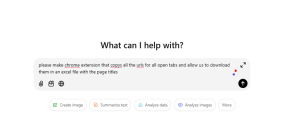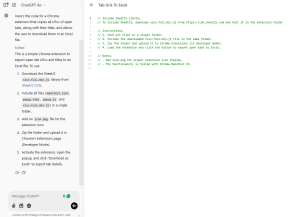Make Money With Google Chrome Extension Store
Have you ever wondered how ordinary people are making millions online while leveraging simple tools? Today, I’m going to uncover a secret method hiding in plain sight on Google. One that has the potential to make 2025 your most profitable year yet. Using Google Chrome extensions and AI, you can tap into a multi-billion dollar market and start earning big. Let’s dive into the steps, strategies, and real life examples to help you get started.
Chrome Extensions Are the Hidden Goldmine

Google Chrome extensions may seem unassuming, but they represent one of the most underutilized ways to generate online income. With over 112,000 extensions on the Chrome Web Store, only 1.7% have more than 100,000 users. Yet, the average earnings of a Chrome extension are a whopping $1.4 million annually. That’s not just hype. It’s real money being made by tools you’ve likely used or heard about, such as the Honey app or Capital One Shopping.
The Power of AI in Chrome Extensions
By incorporating AI into Chrome extensions, you can create tools that are scalable, efficient, and incredibly valuable. AI-powered extensions are projected to grow into a $28 billion market, offering opportunities in everything from productivity tools to creative solutions.
Take, for instance, the idea of a Chrome extension that downloads all open tabs into an Excel file. It sounds simple but solves a common pain point for researchers, content creators, and businesses. With AI tools like ChatGPT, you can create such extensions in hours, not weeks, and monetize them effectively.

How to Get Started:
Step 1: Finding Profitable Chrome Extension Ideas
Every successful extension begins with a simple idea. Your first step is to identify a problem that users face online and create a solution. Here are some niches to consider:
- Productivity: Tools that organize tasks, save time, or automate processes.
- SEO: Keyword density checkers, backlink analyzers, or content optimization tools.
- Research: Extensions that download URLs, export bookmarks, or summarize web pages.
- Local Business Tools: Real estate trackers, local weather updates, or restaurant finders.
How to Generate Ideas
- Keyword Research: Use tools like Ahrefs, SEMrush, or Google Trends to find popular searches related to Chrome extensions. For example, “export Chrome bookmarks” gets over 12,000 monthly searches.
- AI Tools: Ask ChatGPT or similar tools for inspiration. For instance, you can prompt it to suggest useful tools for specific industries or tasks.
- Solve Your Own Problems: Think about tasks you find tedious online. Could an extension make them easier? If so, you’re likely not the only one looking for a solution.
Step 2: Building a Chrome Extension Using AI
You don’t need to be a coding expert to create a Chrome extension. AI tools like ChatGPT can generate most of the code for you. Here’s how:
- Define the Functionality: Decide what your extension will do. For example, let’s say you want to create an extension that exports all open Chrome tabs into an Excel file.
- Use ChatGPT to Write the Code: Input your request into ChatGPT, and it will generate the necessary files:
- manifest.json: The main file that defines the extension’s structure.
- popup.html: The interface users see when they click on the extension icon.
- popup.js: The script that powers the extension’s functionality.
- Customize the Extension: Use tools like IconScout to add custom logos and branding. Edit the popup.html file to include affiliate links or additional information.
- Test Your Extension: Load the extension as an unpacked file in Chrome’s Developer Tools. Fix any errors by ensuring all files match the manifest.json structure.

Step 3: Monetizing Your Chrome Extension
The real magic happens when you turn your extension into a revenue stream. Here are three ways to monetize your tool:
1. Affiliate Marketing
Embed affiliate links directly into your extension’s interface. For instance:
- If your extension helps users find expired domains, promote affiliate links for domain registrars like GoDaddy or Namecheap.
- A research tool could include links to AI tools or SEO platforms like SEMrush.
2. Freemium and Premium Models
Offer a basic version for free and charge for advanced features. Many successful extensions use this strategy, like Grammarly and Honey.
3. Ads and Sponsorships
Place non-intrusive ads in your extension’s interface.
Step 4: Driving Traffic to Your Chrome Extension
Creating a great extension is only half the battle. You’ll need to market it effectively to attract users. Here are some strategies:
- YouTube Videos: Create tutorials or reviews showcasing your extension’s features. Videos like “Top 5 Chrome Extensions for Productivity” consistently attract thousands of views.
- SEO Blog Posts: Write detailed articles optimized with keywords like “Google Chrome extensions and AI” to rank on Google.
- Press Releases: Announce your extension to tech blogs and news outlets.
- Social Media: Share content on platforms like Pinterest, Twitter, and Instagram to drive engagement.
Monetizing Your Chrome Extension
Making money with your extension doesn’t stop at downloads. Here are three lucrative monetization strategies:
1. Affiliate Marketing
Add affiliate links to the extension’s popup interface. For example:
- A toolbar for domain research could include affiliate links for hosting services like GoDaddy or Namecheap.
- A keyword density checker could promote SEO tools like Ahrefs or SEMrush.
2. Freemium and Premium Models

Offer a basic version for free and charge for premium features. Many successful extensions use this model, such as Grammarly and Honey.
3. Paid API Integrations
If your extension uses APIs, consider offering API-powered features as part of a subscription service
Real-Life Chrome Extension Ideas
Need inspiration? Here are some examples of tools you can create:
- SEO Toolkit: A keyword density checker that integrates with SEMrush or Ahrefs.
- Research Organizer: An extension that saves and organizes URLs into Google Docs.
- Local Real Estate Tracker: A tool that pulls house prices by zip code using public APIs.
- Content Generator: A plugin that turns blog posts into YouTube scripts or Pinterest pins.
- WordPress Theme Detector: A tool that identifies the theme and plugins used on any website.
Why This Strategy Works?
What makes Chrome extensions so effective as a business model? It’s simple:
- Recurring Use: Unlike a one-time blog visit, users return to extensions repeatedly, keeping your tool and your brand front of mind.
- Scalability: Once created, an extension can serve thousands (or millions) of users without additional effort.
- Diverse Revenue Streams: From affiliate marketing to premium features, extensions offer multiple ways to earn.
Creating and monetizing a Chrome extension isn’t just a way to earn extra cash. it’s a scalable business model with massive potential. By combining Google Chrome extensions and AI, you can solve real problems, help thousands of users, and generate consistent income.




